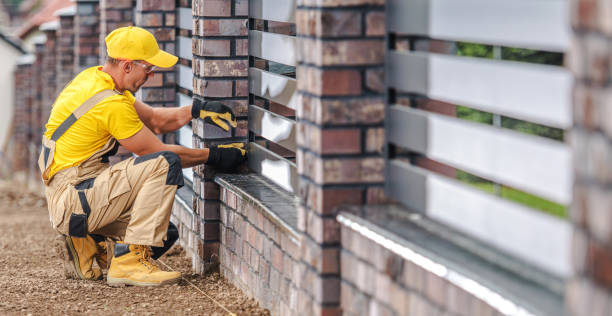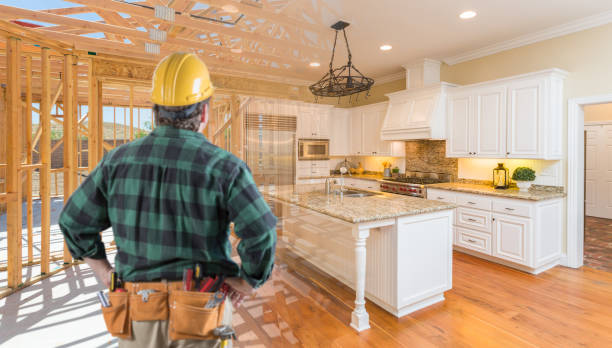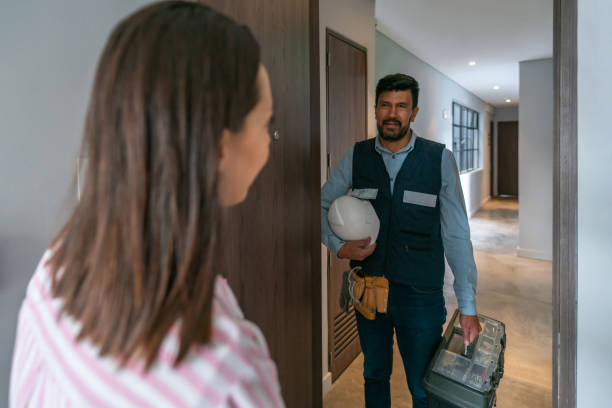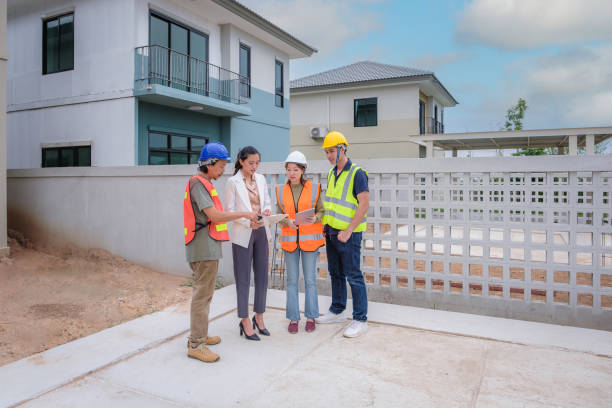
“How to Find Local Contractors Near Me” is something homeowners often tend to wonder about. Finding professional contractors who can tackle a major renovation or home improvement project could be challenging if you recently bought a home in a new community or moved into a new one.
In other cases, such as when there is a need for urgent repairs, as a homeowner, you know that your search for a professional should instead go “contractor near me.”
Homeowners will learn more about hiring a local contractor from this advice, including average costs, the nature of the work, and essential inquiries.
What is a Contractor?

A contractor is a professional hired to oversee and carry out construction or renovation projects. They are responsible for managing the entire process, from initial planning and cost estimation to obtaining permits and supervising the physical work.
Construction Contractors can specialize in various areas, such as residential or commercial construction, remodeling projects, or trades like plumbing or electrical work. They may also be called general contractors, mainly when they handle various construction tasks.

What Issues Do Contractors Fix?

Hiring a contractor is often the best action if you have concerns about your house’s structural soundness or encounter specific problems. Contractors can address various issues, including the following:
Roof damage
Contractors can assess and repair damage caused by weathering, worn-out shingles, or leaks. If you notice missing shingles or signs of a damaged roof, it’s essential to contact a contractor promptly.
Window seal breaks
Windows with broken seals, particularly those with insulated glass units (IGUs) exposed to sunlight, may require the services of a contractor. Broken seals can increase energy costs due to air and humidity infiltration. Consulting a contractor can help identify and fix the problem.
Insulation and structural problems
Contractors can address issues related to insulation in the attic, such as inadequate or excessive insulation and gaps or openings that compromise energy efficiency. They can also handle problems caused by storms, such as bug infestations or water intrusion. Seeking the expertise of a contractor is recommended for these issues.
Common Contractor Projects

The joint projects a contractor can take on and their associated prices are shown below.
Remodeling a kitchen
When done effectively, kitchen remodeling, one of the most popular projects, may significantly raise the house’s value. For an additional $2,600 to $5,200 for a contractor, many homeowners think spending the average kitchen remodel cost of $25,850 is worthwhile.
Adding on to or expanding a home
Find a residential general contractor with building experience to build a new home or add to an existing one. Building a house typically costs roughly $282,000,000. Homeowners should budget an extra $28,000 to $56,000 for contractors. The average home addition cost is $46,750, and employing the best general contractor to manage the project might go anywhere from $4,700 to $9,400.
Complete home renovation
Although it’s a considerable effort, whole-home remodeling might be a good option for relocating or building a new house.
The average cost of upgrading a home is around $47,830—prices for hiring a contractor to supervise the process range from $4,750 to $9,500.
Garage construction
Depending on the size and prefabrication of the building, the typical cost to build a garage is roughly $27,500. Adding building contractors to the project will cost $2,750 to $5,500.
Toilet renovation

Bathroom remodeling might involve more than just cosmetic modifications to the room’s appearance; this is an essential factor to consider when selecting whether to DIY or hire a professional. Bathroom remodeling projects cost, on average, approximately $11,150, and homeowners may anticipate spending an additional $1,100 to $2,200 to hire contractors.
Installation of Drywall
The cost of installing drywall is typically calculated per square foot, whether one wall is added or the entire house is drywalled. A drywall contractor will add $185 to $370 to the average $1,880 drywall project cost.
Exterior Wall Construction
Constructing an outside wall made of brick and stone costs about $5,000. A skilled builder can guarantee that the new external wall is solid and capable of supporting the house. A contractor will cost an additional $500 to $1,000 to accomplish this project.
Building a Deck

Homeowners may expect to pay around $7,750 for a new deck, depending on its size and construction. A contractor will cost you an extra $775 to $1,500.
Installing a patio
A concrete patio installation typically costs around $3,000, though rates differ according to square footage—costs for hiring a paving contractor to install a patio range from $300 to $600.
Fence construction
Depending on the material and size of the land, fence installation might vary in cost and difficulties. The average fence installation cost is $3,000 plus $300 to $600 for fence contractors.
Structure of a driveway
For a new driveway, homeowners should budget about $4,650 on average, and asphalt contractors will charge between $465 and $930 for this work.

What are the Benefits of Hiring a Contractor

While the added costs of hiring a contractor are not insignificant, there are some substantial benefits to leaving the details of a large home project in the hands of an experienced contractor.
Consider the following variables when choosing a contractor for your remodeling or new construction project.
Hiring a contractor for your home construction, remodeling, or renovation project offers several benefits. Here are some advantages to consider:
Experience and expertise
Contractors are experienced professionals who have expertise in managing and executing construction projects. They have the necessary skills and knowledge to handle various aspects of the project effectively.
Time savings

Contractors can save time by managing the project, coordinating subcontractors, and handling the necessary permits and inspections. They can streamline the construction process, ensuring efficient progress and timely completion.
Quality workmanship
Contractors strive to deliver high-quality artistry. They have experience working on similar projects and can ensure that the construction or renovation meets industry standards and regulations.
Access to subcontractors’
Contractors often have a network of trusted subcontractors they work with regularly. This allows them to bring in specialized professionals for specific tasks, such as plumbing or electrical work, ensuring that a skilled individual handles each aspect of the project.
Cost efficiency
While hiring a contractor comes with additional costs, they can help you save money in the long run. Contractors have relationships with suppliers and can often obtain materials at better prices. They can also help you avoid costly mistakes or rework by ensuring that the project is done right the first time.
Project management
Contractors manage the project, including scheduling, budgeting, and coordinating different trades. They handle the logistics and ensure that the project progresses smoothly, relieving you of the stress and responsibility.
Legal and regulatory compliance
Contractors are familiar with local building codes and regulations. They can help you navigate the permitting process and ensure the project complies with all requirements. This can help you avoid potential legal issues or penalties.
Insurance coverage
Reputable contractors carry liability insurance and workers’ compensation coverage. This protects you, your property, and the workers involved in the project in case of accidents or damages.
Warranty and guarantees
Contractors often provide warranties or guarantees for their work. If any issues arise after the completion of the project, they can address them and ensure customer satisfaction.

DIY vs. Hiring a Local Contractor

If you hire a qualified general contractor to manage challenging construction projects, it is because they have the necessary education, training, and experience. They have a network of suppliers with more affordable prices than you can get at the local home improvement center and qualified subcontractors that provide high-caliber work. The general contractor will also handle inspections, permits, and other issues to ensure the job is lawful and compliant with codes.
To save money, a homeowner can become their general contractor. For more straightforward, smaller projects, this works best. You may obtain the necessary permissions and set up inspections with the neighborhood building authority, then perform some of the work yourself and contract out the remainder to subcontractors. Even while it can be a time-consuming and occasionally challenging procedure, those who deeply understand construction could find it appealing.
How to Find a Reputable Contractor

A contractor should be qualified and experienced to accomplish the renovation project. Here are some things to consider and advice on making wise choices when looking for the best local contractors.
Seek referrals
Ask friends, family, or acquaintances for referrals. Recommendations from people you trust can provide valuable insights into the contractor’s artistry and reliability.
Obtain multiple quotes
Request quotes from several contractors to compare their pricing, services, and timelines. Be cautious of contractors who offer significantly lower prices or shorter turnaround times than others, as this could indicate subpar work.
Check credentials and experience
Verify that the contractor is certified, licensed, and experienced in the specific type of project you require. Check their professional references and inquire about their previous work. Contact the local Better Business Bureau (BBB) to see if any complaints have been filed against them. Additionally, confirm their general contractor license with the state licensing board.
Insurance coverage
Ensure the contractor carries workers’ compensation insurance to protect you from liability in case of on-site accidents. Please request a copy of their general liability insurance policy to verify coverage for potential damages.
Review past projects

Ask the contractor for examples of their past projects similar to yours. This will give you an idea of their work quality and style. Some contractors may have portfolios or online galleries showcasing their previous work.
Clear communication
Effective communication is crucial throughout the project. Ensure that the contractor communicates clearly and promptly, addressing any concerns or questions you may have. A responsive contractor who maintains open lines of communication can help ensure a smooth working relationship.
Verify permits and compliance
Confirm that the contractor is knowledgeable about obtaining the necessary permits for your project. They should be familiar with local building codes and regulations to ensure compliance throughout the construction process.
Payment structure
Discuss the payment structure with the contractor upfront. Be cautious of contractors who request a large upfront payment or demand full payment before completing the work. It’s common for contractors to require a deposit or progress payments based on project milestones.

Questions to Ask Local General Contractors

- Is my project being worked on by a committed team? Will you use freelancers?
- Which varieties of insurance do you have?
- Please include references for recent initiatives that are similar to this one.
- How long will my project take?
- What oversight will my project receive?
- The payment plan looks like this.
- How will modifications in the work scope or cost be handled?
- What does your crew’s typical workday entail?
- Do you possess a license to perform this type of contract work?
- Will you arrange for all relevant inspections and obtain all required building permits?
- What difficulties do you anticipate with my project?
- Will you deliver a formal lien waiver after work is finished?
- Whom should I contact first? How do you interact with customers?
- Does the service or the materials come with a written warranty?
Bottom line
The bottom line is that hiring a licensed general contractor for your home renovation or repair projects is essential for a successful outcome. While it may involve additional costs, the benefits of working with an experienced professional outweigh the risks of attempting the task alone or hiring an unreliable contractor.
Contact us to start working on that property and realize your house’s full potential. We love to serve you right.

